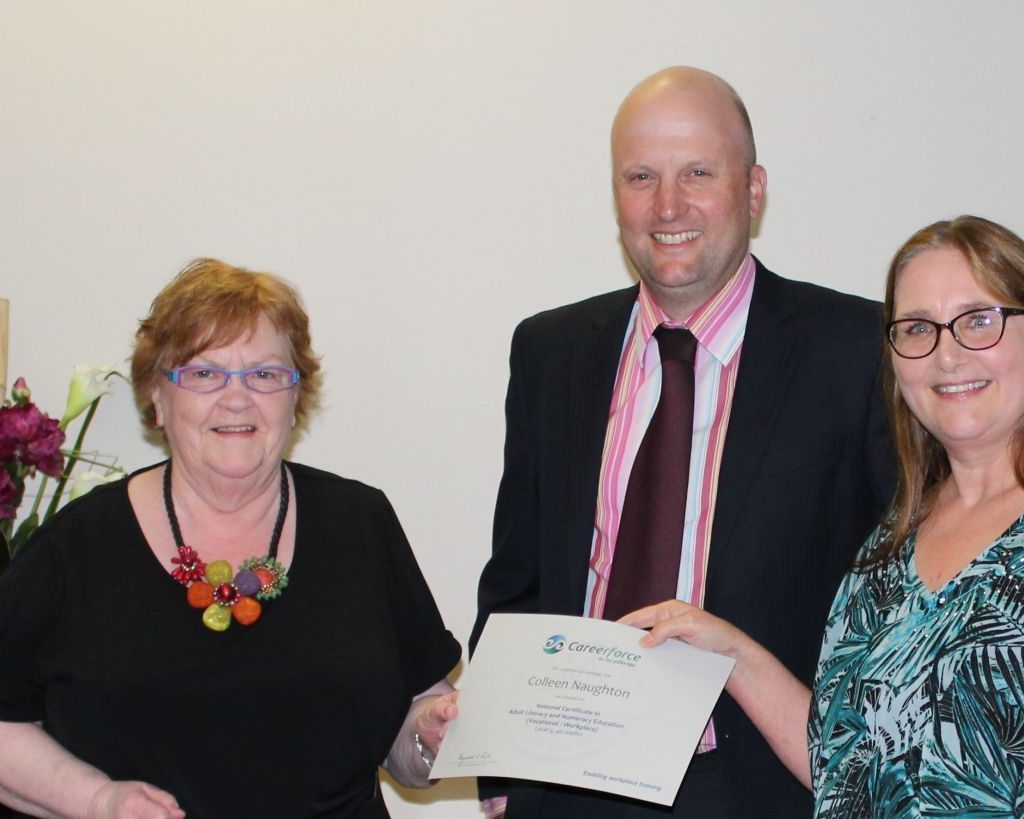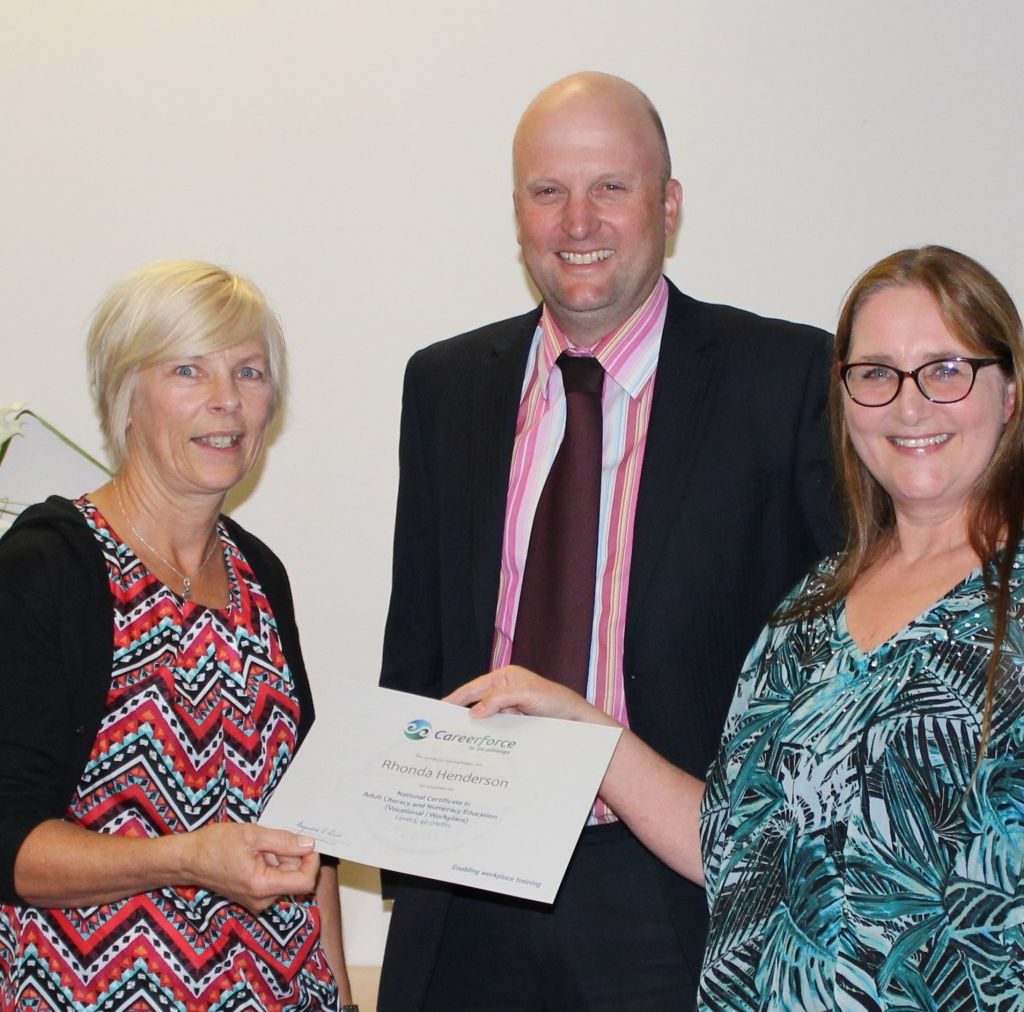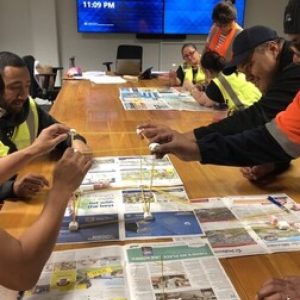Since Craig Stewart completed the National Certificate of Adult Literacy and Numeracy (for Vocational / Workplace Tutors) Level 5, he has noticed a marked difference in how staff are interacting at Canterbury DHB.
Stewart, an orderlies’ trainer/assessor, says embedded literacy and numeracy training has resulted in more communication between the trainees and clinical staff, and greater confidence in general. “They are walking ten feet tall and are proud of themselves,” says Stewart of the trainees. “The majority have really come out of themselves and want to communicate more about what they’re doing.”
 The Industry Training Organisation, Careerforce, has discovered after many years arranging training for the health and wellbeing sectors that the best way to embed literacy and numeracy is to support workplaces to do it themselves. “Literacy and numeracy is more likely to become business-as-usual if educators are doing it themselves in their own workplace,” says Careerforce’s Literacy and Numeracy Advisor, Cushla Wilson.
The Industry Training Organisation, Careerforce, has discovered after many years arranging training for the health and wellbeing sectors that the best way to embed literacy and numeracy is to support workplaces to do it themselves. “Literacy and numeracy is more likely to become business-as-usual if educators are doing it themselves in their own workplace,” says Careerforce’s Literacy and Numeracy Advisor, Cushla Wilson.
Careerforce investigated arranging the delivery of the Level 5, National Certificate of Literacy and Numeracy Education for Vocational / Workplace Tutors (NCALNE [Voc]) to workplaces regionally. However, feedback indicated that the cost was a barrier for workplaces.
The solution was to partner with a distance-learning provider and for Cushla to facilitate the learning through study groups around the country. This made the qualification free for Careerforce’s workplace educators. Currently there are 40 graduates, with a further 12 workplace educators working their way through the qualification. The success of the initiative has gained Careerforce a Skills Highway Promotion and Awareness payment.“There’s this wonderful ah-ha! moment in the study groups, when the educators realise they’re on the right track or identify strategies to support particular trainees,” says Cushla. “They begin to recognise all of the things they’re already doing that naturally embed literacy and numeracy learning into the training and the working day.”NCALNE (Voc) graduates are working and educating in the aged support, cleaning, mental health, disability, orderly services, youth work, and social and community services sectors.

“Communication is vital,” says Cushla. “When you’re providing support services for people in need every day, your staff really have to understand and be understood. Many adults who haven’t reached their potential in childhood education may focus on their speaking and listening skills in adult life and gravitate towards work that requires oral communication skills and practical skills. Our educators often describe trainees as great relationship-builders, perceptive and naturally caring, making them ideal members of the health and wellbeing workforce. Limited skills in reading and writing may not present themselves until trainees are expected to write handover notes or incident reports or engage with text-based training programmes”.
Cushla also notes that digital literacy is quickly becoming an essential workforce skill. “Like every other industry, our workplaces are moving more and more to digital formats to collect data and generate reports. Some of the larger workplaces have established digital training and assessment platforms that staff are expected to engage with”. Identifying the digital literacy demands and training needs of our workplaces is part of a piece of research Careerforce is doing shortly with the NCALNE (Voc) graduates.
Canterbury DHB NCALNE (Voc) graduates were celebrated in a recent CEO Update publication, which promotes the qualification and the new approach to training. It states that new teaching methods are breaking down barriers, and boosting understanding and confidence. “Low level literacy doesn’t need to be a barrier to success at work.”
NCALNE (Voc) graduate and Canterbury DHB nurse educator Dinesh Lal says he now has a much greater awareness of individual learning needs. “Now I think ‘how can we vary our training to meet more of those needs instead of meeting just a select few?’ It’s given me a whole lot of different activities to incorporate into the teaching I do,” says Dinesh.
“Developing literacy and numeracy skills can open up the world for adults, inside and outside the workplace. There is endless evidence about literacy and numeracy provision changing peoples’ lives,” says Cushla. “They begin reading to their kids, helping with their homework, developing budgeting skills, getting involved in their communities, engaging in personal and professional development, and more.”When surveyed recently after completing the qualification, most educators expressed a passion for improving their practice and for providing better support for trainees. “I realised,” says one educator, “that low levels of literacy and numeracy were likely to be contributing to several areas of ‘poor performance’, and this gave me an opportunity to solve some operational issues, as well as make a difference to our people.”
Says another, “I wanted to gain further knowledge to support and mentor learners more effectively through the community connections learning programme. I am open to new knowledge and I love learning.” “It was timely, necessary in the workplace, and free to complete.”
One graduate said they had known about the literacy issues in the workplace. Gaining the qualification helped to reinforce the current literacy support provision, while boosting their skills and confidence.
A number of graduates saw Careerforce’s support as a huge help. The juggle of work and study was only manageable due to the guidance and facilitation. “If I did not have the support of Cushla, I would probably not have completed the qualification.”

